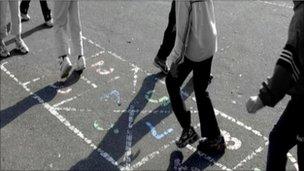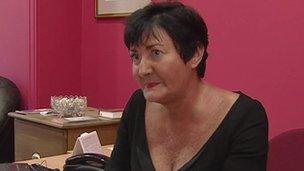Struggle to get children put in temporary care returned
- Published

An increasing number of parents who voluntarily hand their children over to Social Services for short term respite, are finding it extremely difficult getting them back again.
The BBC has learned that figures for so-called voluntary accommodation have increased dramatically across NI.
One mother said she had spent nine months trying to get her children home.
A solicitor said her workload had tripled due to the number of families now finding themselves in court.
The BBC has changed the woman's name to protect her identity and privacy.
Diana is a single parent who has several children. Almost a year ago, after her relationship broke down, she became depressed and desperately in need of help.
"I put my hands up in the air and admitted I needed help. I felt depressed, drained, I just couldn't cope," she said.
Social services became involved in the family's life after they failed to turn up at hospital and dental appointments. Some concerns were also raised about their attendance at school. Diana said looking back, she should have been more responsible.
"I admit I should have been doing things differently, but I was struggling."
According to Diana, her social worker advised she could voluntarily place the children in care until she sorted herself out. Her understanding was that it would last a couple of weeks.
"They said it was voluntary, basically it would be a short break. That's what I thought it was going to be - or I would never have agreed," she said.
That was nine months ago. Diana is now having to go through the courts in an attempt to get her family back together again.
"I didn't realise straight away - it was quite scary - it starts off as two weeks voluntary, you put your trust in social services and the next minute you are in court. I didn't think it would take this long."
Last year in Northern Ireland over 1,000 children were voluntarily placed in care by their parents for what normally lasts a few weeks. The system is called voluntary accommodation and helps those parents who may be in crisis.

Solicitor, Hilary Carmichael, described the system as a "geographical lottery"
Unlike a court order, it doesn't require a judge's approval and is very much a decision taken by the health trust involved in the case. Parents remain in charge of their children and can normally dictate when they want their children to come home.
However, solicitor Hilary Carmichael said some parents are finding that depends on where they live.
"The system needs looked at quite drastically because it is very much a geographical lottery," she said.
"If you live in one trust, for example the Western Health Trust, you are more likely to have your children kept with you and an excellent family support package put in place to help you keep your family together.
"However, if you live in another area, such as the Northern Health Trust, you are less likely to keep your children with you and they are more likely to be placed in voluntary care. I call it internment for families."
The BBC can reveal that the number of children being placed in voluntary accommodation is on the increase. In fact, in one health trust the figure has risen by almost 140% in three years.
Last year in the Western Trust, 57 children were placed in care voluntarily by their parents. In the Southern Trust, that figure reached 128.
Within the South Eastern Trust, 174 children were placed in voluntary accommodation. In the Belfast Trust 225 families, while in the Northern Trust the figure was 461.
Most of the health trusts were unable to tell the BBC just how many children have been returned to their families, but in Hilary Carmichael's experience fewer children are returning home.
"It is really heartbreaking. Most of these families don't appreciate they could end up in court."
While social workers are often left with no choice, there are some concerns that the system has a negative impact on the family.
Gillian McGaughey is a barrister and solicitor at the Department of Legal Studies at Queen's University.
"With voluntary accommodation there is no specific legal plan drawn up between the trust and the family," she said.
"It is very much a voluntary arrangement with no independent or objective view being given by a third party.
"With a court order however, a judge reviews the case and he stipulates whether or not and often for how long a child should be removed. "
In a statement, the health trust involved in the case told the BBC: "The trust works with families to make certain they can provide good care for their children while ensuring they remain safe.
"At times the trust may be required to make difficult decisions to ensure that the needs of children continue to be met, where parents may not be in full agreement."
Meanwhile back at home, Diana prepares to see her children. That meeting will last for just over an hour. She said that recently her social worker had mentioned the prospect of her children being put up for adoption.
"It's heartbreaking, I just want to get them back and to be a mum again.
"I had been a mum for all those years, then suddenly it's gone."
- Published14 March 2011